The journey since March 2020
The Covid-19 pandemic has impacted every business sector, whether that has been through disruptions to supply chains, empty offices, workers being forced to self-isolate, travel restrictions or premises’ doors being forced to close temporarily. The challenges have been widespread, but it’s clear that different industries and sectors have been impacted in different ways.
In this report, the business credit scores of 2.2 million UK businesses have been analysed and tracked over an 18-month period to explore the trends across different sectors. The data includes firms of all sizes, from SMEs to large corporations employing tens of thousands of people, helping to paint a picture of UK business health.
The report shows not only when and how different industries suffered as a result of the pandemic, but also tracks the progress of their recovery. Businesses and their customers have reacted in different ways to the challenges presented by Covid-19 and, as restrictions imposed on people have been tightened or loosened, the knock-on effect has varied for different sectors.
- The national picture
- The automotive sector
- The retail sector
- The travel sector
- The advertising and market research sector
- The veterinary sector
- Regional breakdown
- Conclusion
The national picture
Across all 2.2 million UK businesses analysed for this report, we can see a clear view of how the Covid-19 pandemic, and the associated restrictions on trading and movement, impacted business credit scores.

Taking an average of all businesses in the report, across every sector, business credit scores dropped from 44 to 43 between March and May 2020. This period covered the initial UK-wide lockdown when non-essential shops and the leisure industry was forced to close their doors and people were required by law to remain at home.
As restrictions started to ease, scores quickly rebounded back to higher than pre-pandemic levels in June 2020. However, as the summer continued, business credit scores fell again and hit a low of 41 by September. Average scores remained around this level throughout Autumn, until December when restrictions over Christmas were quickly followed by a new national lockdown and scores bottomed out at 40 – a drop of -9.1% compared to March 2020.
The recovery: Throughout this lockdown period, scores remained stable at 40 until March, when the Government announced its roadmap out of lockdown. The recovery in business credit scores was very slow, but steady, and increased back up to the pre-pandemic average of 44 by September 2021.
The data shows just how successful many businesses have been at coping and quickly adapting their operations to be able to operate while under Covid-19 restrictions. While it’s apparent that businesses suffered during periods of lockdown when legal restrictions were in place, the speed of recovery when more positive news has come out has been consistent.
The automotive sector
The automotive sector, which includes the wholesale and retail trade and repair of motor vehicles and motorcycles, maintained a consistent average business credit score of 49 during the first UK lockdown.

Compared to the national picture:
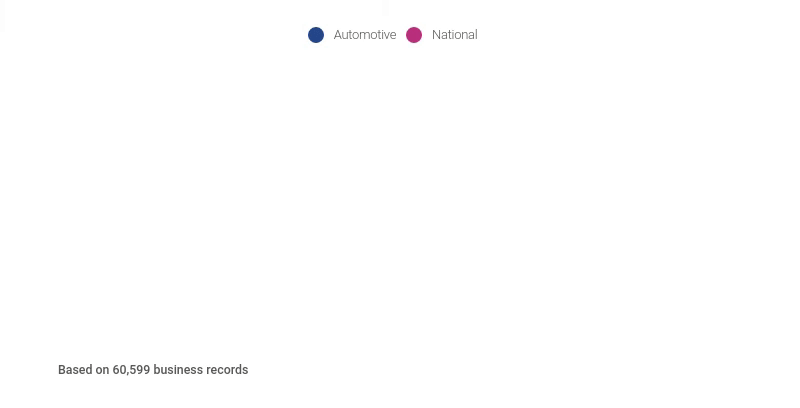
This credit score had remained largely unchanged since December 2019. Whether or not sales were affected from March through to the summer, most businesses that operate in that sector remained in a stable position, making payments on time and filing accounts as and when required.
As the UK moved into a system of regionalising restrictions in Autumn 2020, and then into a full national lockdown in November, the sector’s average business credit score fell sharply by -8.2% over the course of a 2-month period, flattening out at a score of 45 in December.
The recovery: As quickly as business credit scores fell, the automotive sector rebounded at a rapid pace. This started in February 2021 with a single point rise, before the roadmap to end lockdown was announced in March and scores jumped +6.7% to 48 by April 2021. Since then, scores rose again in July and have continued to hold firm at the pre-Covid-19 trend of 49.
The Covid-19 pandemic clearly impacted new car sales in the UK. Vehicle licencing statistics from Gov.uk show that there were 2.1 million new cars registered in the UK in 2020, a fall of -27% compared to 2019 as people had less need to travel, and personal finances may have impacted on consumers’ ability to purchase vehicles. Despite this, business credit scores did remain consistent through the majority of the year, and it was only in Quarter 4 when scores really started to suffer.
The retail sector
The retail sector was one of the hardest hit by the Covid-19 pandemic. Restrictions that first started in March 2020 forced all non-essential retailers to close their doors to shoppers. Those that had online sales functions in place quickly adapted their operations to focus entirely on digital sales, but those that didn’t have an online sales channel were left unable to service customers.

Compared to the national picture:
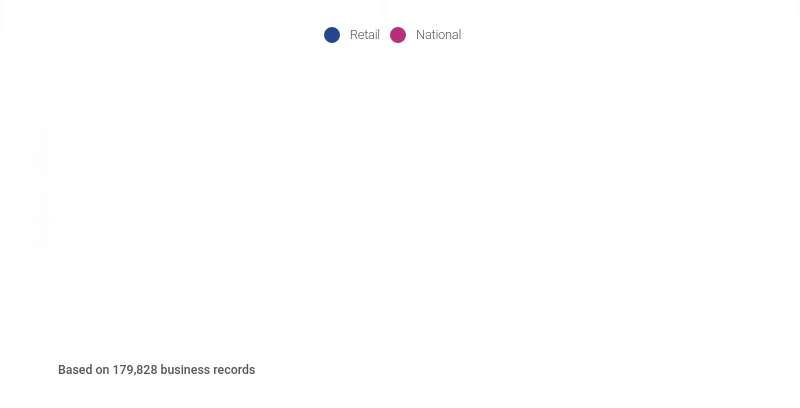
Average business credit scores started falling immediately following restrictions being placed on physical retailing. Scores rose twice over a nine-month period in June and October as restrictions were eased, but November’s lockdown saw a further fall to take the average score to 26, which represented a -29.7% reduction compared to March 2020. Scores remained at this low-level right through Christmas, traditionally the busiest period of the year for retailers.
The recovery: Average business credit scores have struggled to improve in 2021, remaining at the low of 26 right through the summer, however scored jumped sharply in September 2021 and now stands at 31, a +19.2% increase from the Christmas period.
It’s clear that there was a direct correlation between retailers’ business credit scores and their ability to sell goods within physical stores. Many retailers will have attempted to shift consumers towards online sales, but the increased fulfilment delivery costs of these orders will have squeezed retailers’ margins and, as such, the sector’s business credit scores still suffered. The recovery has much slower than other sectors, with scores struggling to improve despite stores opening in April 2021.
The travel sector
One of the hardest hit sectors in terms of Government restrictions, the travel sector has been unable to operate ‘as normal’ since March 2020.

Compared to the national picture:
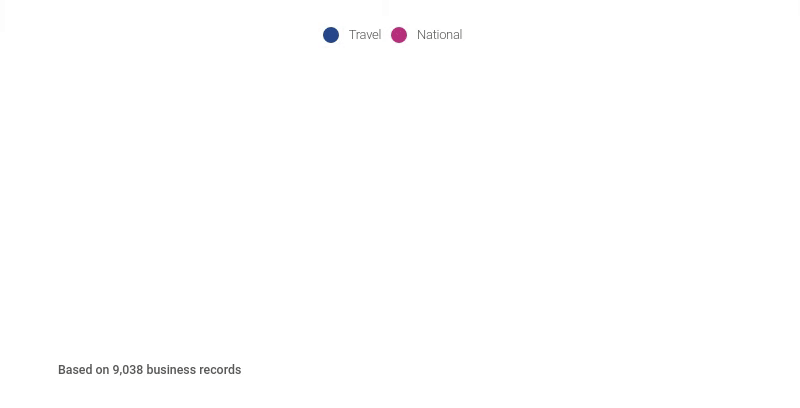
Average business credit scores dropped immediately by one point in May. While scores rebounded in June back above pre-Covid-19 levels as restrictions were loosened, the summer ended up being a very difficult time for the sector. Traditionally the busiest period of the year for the travel sector, scores dropped back down to 42 and remained at this level until January, when further national restrictions saw the sector fall to 38 (-13.6% from pre-Covid-19 levels).
The recovery: While the travel sector has still not opened up fully, business credit scores did rebound in April as restrictions across the UK were loosened. However, after rising up to 40, scores fell further, down to a new low of 30.5 in September 2021 – a drop of -30.7% compared to March 2020.
The UK travel sector, in its nature, is hugely affected not only by restrictions at home, but also abroad within popular tourist destinations. Data from the Civil Aviation Authority showed that the number of passengers travelling through UK airports fell by 223 million people compared to 2019 – a fall of -75%. The inability for people to easily travel abroad, and hesitancy amongst the public on the safety of travel clearly had detrimental impact on the UK travel sector.
Unlike many other sectors, the UK travel sector has not enjoyed the recovery in business credit scores as many restrictions in the UK were loosened in the second quarter of 2021. Businesses operating in the sector are expected to continue to struggle, and we could see further falls in average business credit scores until the travel sector is completely opened up across the UK, Europe and North America.
The advertising and market research sector
Advertising and marketing agencies, while not placed under any specific restrictions unique to their industry, did suffer as their clients working across different sectors reduced budgets and delayed payments.

Compared to the national picture:
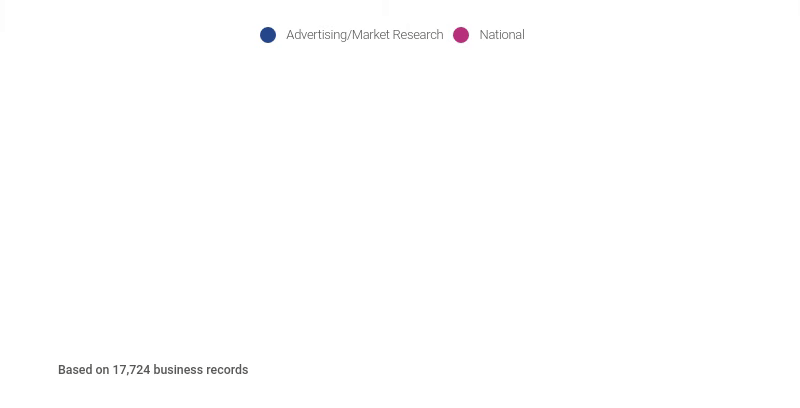
There was a delay to the sector’s average business credit scores falling, possibly as businesses spent time assessing the situation before reducing budgets, but by May 2020 average scores for the advertising and market research sector had fallen -18.8% to 26.
Scores did rebound over the summer back close to pre-Covid-19 levels, but they quickly fell away and remained at 26 through to April 2021.
The recovery: As the roadmap out of Covid-19 restrictions were announced, businesses operating in the advertising and market research sector didn’t benefit from a sudden surge in improving scores. A consistent level of 26 was maintained right through until August 2021 when a single point rise was followed by a sudden jump to 32 in September – taking the scores back to pre-pandemic levels.
The UK is home to some of the world’s leading advertising and market research companies, and as such their performance is determined by the advertising budgets of their clients not only in the UK, but also across the world. It’s clear that as businesses suffered as a direct result of the pandemic, marketing budgets were reduced. A Gartner Report found that marketing budgets accounted for just 6.4% of total revenue in 2020, compared to 11.0% in 2019.
However, as the business world has opened up, performance in the advertising and market research sector has improved in Q3 2021. Many businesses will be looking for opportunities to take market share in 2022 due to changing consumer habits and with many of their competitors suffering due to the pandemic. Marketing and advertising will play a huge part in reaching those new customers, and as such advertising companies look set to benefit.
The veterinary sector
While vets across the UK were allowed to remain open to treat pets, due to being classed as an essential service, the social distancing restrictions meant that volumes of ‘patients’ were lower, and this affected business credit scores.
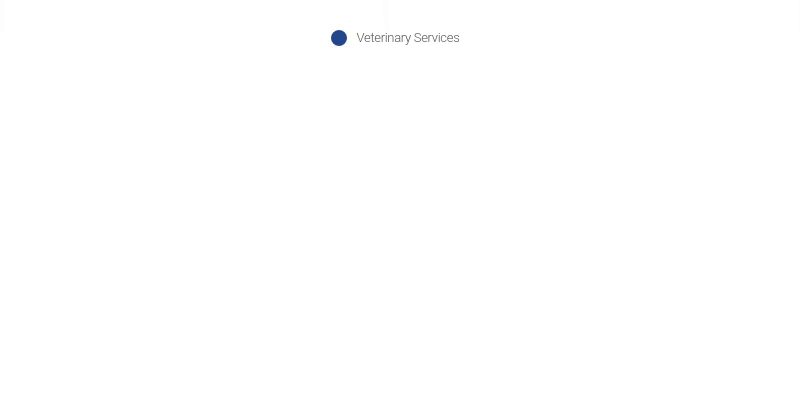
Compared to the national picture:
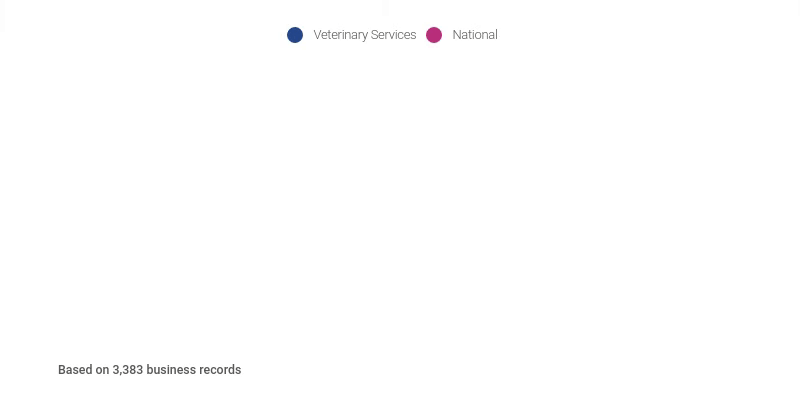
After remaining resilient through the first few months of lockdown, average scores dropped down to 55 in August 2020 – however, scores rebounded back above their previous level by January 2021.
As the UK population was forced to work from home in their millions, many people took the opportunity to buy pets. A report from the Pet Food Manufactures’ Association found that 2.1m Brits added a pet to their household in lockdown, and a further 1.8m were planning to. This rapidly increased demand for veterinary services, and the businesses that operate in that sector benefitted. Average business credit scores increased from 57 to 70 between October 2020 and September 2021 – a rise of +22.8%.”
Regional breakdown
It’s clear that there is disparity in how the Covid-19 pandemic has impacted average business credit scores across different sectors, but businesses have also been affected in different ways depending on their geography and location.
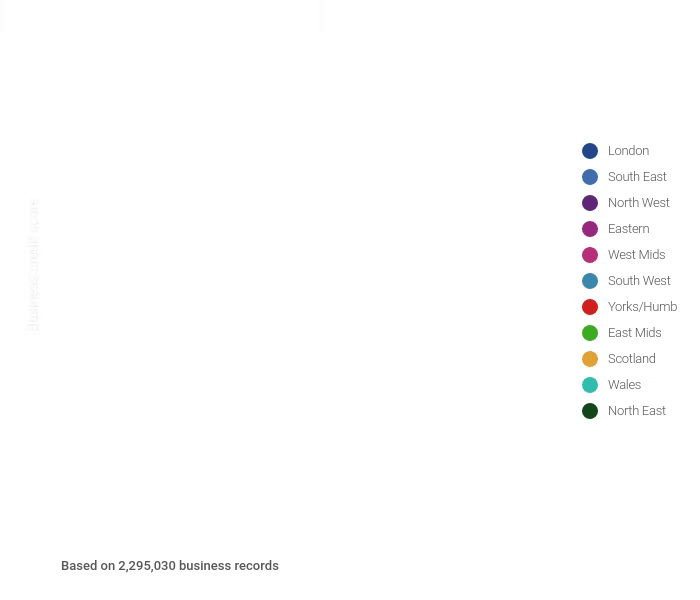
Every region across the UK saw average scores drop throughout the 18-month period after the first UK-wide lockdown. Businesses operating in the North West of England was the area of the UK hit hardest by the pandemic, with average scores falling from 42 in March 2020, down to a low of 35 in January 2021 – a drop of -16.7%.
London, despite having the lowest average scores across the UK was the area where businesses were least impacted by the Covid-19 pandemic. Average scores remained consistent at 26 throughout the first lockdown in 2020, only dropping a single point to 25 in December. The capital remained at this level throughout the 2021 winter lockdown but has since recovered to its pre-pandemic level. London is generally considered a start-up hotspot, so it’s likely that the average age of many of these businesses is lower than other parts of the country. More established companies tend to have a more detailed credit history, translating into a more positive credit score. Meanwhile, younger businesses usually score lower.
The North East of England stands alone as the region which has surpassed its average score in March 2020. By August 2021 the North East had reached 44, matching its pre-pandemic levels, and since then has actually improve a further point to 45 in September 2021.
Conclusion
Businesses of every size, operating across every industry have been affected by the Covid-19 pandemic. Whether that has been a loss in demand for their products or services, restrictions on how and what they can sell, or staff shortages – the challenges have constantly evolved and businesses have been forced to adapt.
It’s apparent in the data that there is a direct correlation in the performance of businesses and the restrictions that were placed upon them by the Government. There’s a general trend of an initial shock to business at the start of the pandemic in April 2020, before a slight resurgence over the Summer and Autumn. The Christmas restrictions and Quarter 1 2021 lockdown seemed to deliver the biggest negative impact on business, with most sectors experiencing their lowest average business credit scores during these months.
The level by which scores have fallen and businesses have been impacted has varied hugely, as too has the speed, pace and timing of the recovery in 2021. In general, the recovery has been swift, with business credit scores rising back to, or close to, pre-pandemic levels in a much shorter period of time than it took for them to fall to that level.
If you’re looking to improve your business credit score, here are seven steps you can take:
- View your business credit report to understand the positive and negative factors in your history, and plan the best path for progress.
- Make a note of suppliers’ payment terms and plan payments so they are on time. Poor payment performance can indicate a business struggling to service its debts.
- File annual returns and financial accounts on time. Making more information on your business available helps suppliers, utility providers and lenders to understand it and make appropriate decisions.
- Avoid County Court Judgments. Should one occur, settle it promptly.
- Keep an eye on your personal finances. Directors’ personal credit scores can be taken into account for new businesses when little information is available.
- Appoint a director with a strong history of running companies and a good credit score to help boost your company’s standing.
- Check and monitor the credit status of the companies you work with, so you can anticipate any supply chain problems before it affects your business
What does your Experian business credit score mean?
| Delphi Score | Category |
| 0 | Failed company |
| 1 | Imminently failing company |
| 2-15 | Maximum risk |
| 16-25 | High risk |
| 26-50 | Above average risk |
| 51-80 | Below average risk |
| 81-90 | Low risk |
| 91-100 | Very low risk |
Check and improve your business credit score with My Business Profile
Find out moreAbout Experian business credit scores and methodology
The Experian Commercial Delphi Score, which powers the data provided in this report is an analytical tool designed to highlight the strength, performance and ultimately the creditworthiness of a company. Scores range from between 0 and 100 – a score of 0 represents a high risk, while a score of 100 indicates that a business presents a very low financial risk.
The Experian Commercial Delphi Score is calculated by monitoring and measuring a number of KPIs for every business, including financial results, average trade creditor time, county court judgments, director track record, insolvency events, delays in financial reporting filing and credit applications.
This report takes all businesses within any given period that have a Delphi Score and calculates the median value for that population. Populations do vary from month to month, as businesses exist or enter the report – for example a firm may have been operating with a Delphi score in June and therefore would be included, however if it closed down the following month its score would then not be included in the average.
